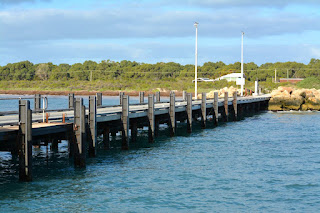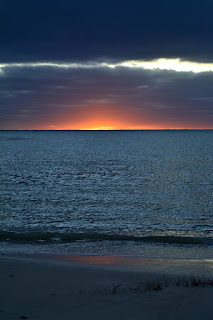Good Morning Geraldton!
Low 7°c (45°F) – High 16°c (61°F)
Finally a moving day but it felt strange after having been in
Geraldton for so long. I had mixed
feelings about going with enthusiasm for travel still at an all time low ebb
and a little bit of concern for the ankle which is continually swelling the
more I walk on it, but we’ve now become so far behind schedule that we’ll need
to try to make up a bit of mileage in order to get home in time and so need to
make a start.
But not before a special birthday gift was bestowed upon me –
a necklace that Shane had purchased in Broome that I had really liked. He’s a special kid really and I don’t know
what I would do without him.
The trip was around 230km and everything went smoothly but
the salt bush scenery was pretty much the same all the way and despite
following the coast along this stretch of the journey, you get to see very
little of the Indian Ocean that lies to the west of you. We pulled in to Cervantes and the caravan
park around midday having left just after 9.00am and were allocated a site that
while it had not much of a view, it was close enough to the ocean to hear the
waves at night when everything was quiet, and being on a west facing corner of
the internal park roads we had no-one beside us so could enjoy the afternoon
sun sitting outside. Originally having
booked just the one night, and on seeing my ankle severely swollen after the
first drive, Shane booked an extra night in an effort to give it a rest. The weather forecast was good for a couple of
days of mostly sunshine so even ankle aside, it sounded like a better option
than driving on into forecast rain.
After setting up and while having a bite to eat for lunch I got a phone
call from Lakeisha & the girls which cheered me up immensely. It’s a long time to be away from your little
family that you love so much and that has definitely impacted my sense of
wellbeing over the last week or so.
After a long chat on the phone for over 2 hours and catching up on all
the news, and Shane sneaking in a bit of a snooze, we decided to go for a drive
around the town. Cervantes was quite the
surprise – a quaint little coastal town that once again was larger than it
first appeared. The diverse housing is to
the extreme as there are some really up market, double storey, luxury look
homes – some of which are obviously holiday homes but some also have people in
residence, while there are also still many 1960s holiday houses built of fibro
and aluminium cladding catering for enthusiastic fishermen. Being so close to Perth – less than 200km
down the coast – makes it an ideal place for a holiday home getaway I guess, in
easy reach for a weekend but it’s also obviously a popular retirement location.
At the 2016 census, Cervantes had a population of 527 and was a
Western Australia State Finalist in the 2017 Tidy Towns competition for the
Heritage and Culture award. The town
itself was established in 1962 to accommodate workers in the local cray fishing
industry and was named after a ship that was wrecked nearby in 1844. The ship,
in turn, was named after Miguel de Cervantes, author of Don Quixote. Most of the streets are named after cities,
regions and rivers in Spain. In 1962 the government removed 505 hectares from
the northwest corner of the Nambung National Park to establish the town. The principal industry as you would expect
is fishing. One of the staples in town is a huge rock lobster
processing plant, The Lobster Shack, which offers both cruises and an
opportunity to have a lunch featuring their product.
Apparently Cervantes, the ship, was anchored off Thirsty Point,
the promontory which lies to the west of the town and separates Nambung Bay
from Ronsard Bay, when the ship was blown ashore on an island to the south of
the point. The island was named Cervantes and, in 1963, it was given to the
township which grew on the mainland. Cervantes
first whaling voyage to Western Australia had taken place in late 1841. This
had been under the command of B.F. Brown, possibly one of the owners. In 1841 while in Albany acquiring provisions
three crew, Joseph Clark, John Morrison and James Wolley, deserted. After being
captured and jailed they broke out of jail and hid, giving themselves up to the
authorities only after the Cervantes had left port. They were each fined 10
shillings, in default of 10 days hard labour.
When it was wrecked the Cervantes was on its second whaling voyage to Western Australia, having left New London on 23 June 1843. While anchored in Jurien Bay the crew was fishing, and a gale blew up. Before the vessel could make sail and weather the gale out at sea it was driven on to a sand-bar. The crew got ashore, and three of them arrived in Perth on 6 July to report the loss. It was reported that the vessel had suffered only minor damage however its keel was broken, and because of the distance from Fremantle, which was the nearest place where effective repairs could be carried out, it was decided to sell the vessel.
The Cervantes and its contents were auctioned with the wreck and all
its stores and whaling gear fetching £155. The ship’s chronometer sold
separately for £23. After the salvage, the wreck was still visible above the
water. Since then various materials have
been collected, a local person recovered some timber in July 2002 and pieces of
old timber, probably from this wreck, are sometimes found on the beach near
Cervantes.
Passing the Lobster Shack with its large array of delivery trucks, we
headed down to the local jetty. While I
was watching various birds flying around the area, a Cormorant was doing an
amazing job of diving for fish with great success. I couldn’t believe how long he stayed under
water with each dive coming up many meters from where he had gone under. Apparently they are excellent divers, and
under water they propel themselves with their feet with help from their wings;
some cormorant species have been found to dive as deep as 45 meters
(150 ft).
As we left the jetty, a very watchful pair of eyes was upon us from
above. The beach, although congested with
a fair bit of seaweed, was very pretty, the waves almost lace-like as the froth
rolled over the sand. The water here,
and in fact pretty much all the way down the coast that we have seen, is so
incredibly clear you can see the sand at the bottom even in quite deep water. There are a number of lookouts along the
coast, all spotlighting beautiful white sand, a stunning contrast to the blue
of the water on a sunny day.
The town centre isn’t much more than a handful of stores, including a
large general store that serves as the local supermarket, coupled with a few
places to eat, bowling club, hotel and of course the Lobster Shack.
We headed back to camp and spent quite a few hours sitting outside and
talking and even had dinner outside even though it was fresh but not too cold. Being a birthday you have to have cake – and
when only the best will do – Shane had purchased a Freddo Ice-cream Cake. All three of us enjoyed that! Shane went for a wander down to the beach to
take a few sunset photos and a little later with still some stormy colour in
the sky, I went just outside the park gates opposite our site to take a few
more photos. It finally started to get a
bit too cool around 8.00pm so we headed back inside the van. It was lovely while it lasted. Another birthday done and dusted and spent in
a unique location, it was a really enjoyable day.
Absolutely dog tired, I was literally nodding
asleep by 9.00pm and the ankle was quite swollen, so it was an early night to
bed.
Low 7°c (45°F) – High 16°c (61°F)
When it was wrecked the Cervantes was on its second whaling voyage to Western Australia, having left New London on 23 June 1843. While anchored in Jurien Bay the crew was fishing, and a gale blew up. Before the vessel could make sail and weather the gale out at sea it was driven on to a sand-bar. The crew got ashore, and three of them arrived in Perth on 6 July to report the loss. It was reported that the vessel had suffered only minor damage however its keel was broken, and because of the distance from Fremantle, which was the nearest place where effective repairs could be carried out, it was decided to sell the vessel.





















































No comments:
Post a Comment